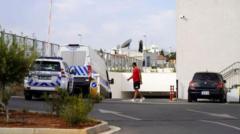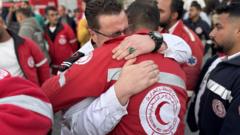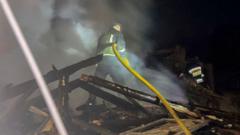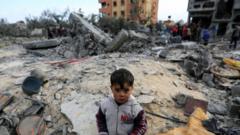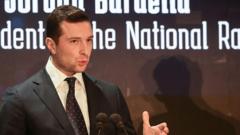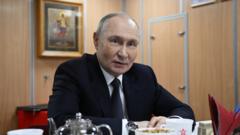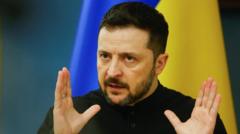The recent airstrike marks a significant breach of the November ceasefire with Hezbollah, raising concerns over renewed conflict in Lebanon.
**Israel Launches First Airstrike on Beirut Since November Ceasefire**
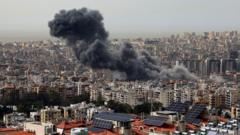
**Israel Launches First Airstrike on Beirut Since November Ceasefire**
Israeli military strikes Hezbollah drone facility, escalating regional tensions.
In an unprecedented move since the ceasefire with Hezbollah was implemented in November, Israel has conducted an airstrike on the southern suburbs of Beirut, targeting a drone storage facility associated with the militant group. The Israeli Defense Forces (IDF) carried out the strike after issuing an evacuation warning, which caused panic in the area. This military action came just hours after rockets were fired from southern Lebanon towards northern Israel, an act that Israel deemed a "violation" of the ceasefire. While Israel reported intercepting one of the rockets, the other reportedly did not reach its target. Hezbollah, however, denied involvement in the missile launch.
The IDF characterized its strike as a necessary response to the breach and imposed responsibility on the Lebanese government for upholding the ceasefire agreement. The office of Lebanese President Joseph Aoun, currently in Paris for discussions, echoed these sentiments by labeling the airstrike as a violation of the understanding brokered by France and the United States. Aoun called for international intervention to safeguard the ceasefire, which had been fragile since its inception.
This escalation compounds the issues Lebanon faces in asserting authority over its southern regions, traditionally under the influence of various militant factions, including Hezbollah, Hamas, and Islamic Jihad. Despite the ceasefire, Israel has conducted frequent airstrikes targeting Hezbollah individuals and facilities, claiming self-defense against rearmament efforts. In turn, the Lebanese government asserts that these military actions, alongside Israeli forces' ongoing presence in southern Lebanon, violate the terms of the truce.
Recent hostilities have raised the specter of renewed violence, particularly given that the rocket attack on Friday is the second incident from Lebanon in a week. Previous strikes saw Israeli forces hit multiple targets, resulting in casualties and injuries. As tensions rise, the fragile ceasefire—which put to an end over 13 months of conflict—remains in a precarious state, with both parties wary of escalating clashes. The broader implications for the Lebanese population, reeling from last year's extensive conflict which resulted in significant loss of life and displacement, continue to cast a long shadow over potential diplomatic resolutions.
The IDF characterized its strike as a necessary response to the breach and imposed responsibility on the Lebanese government for upholding the ceasefire agreement. The office of Lebanese President Joseph Aoun, currently in Paris for discussions, echoed these sentiments by labeling the airstrike as a violation of the understanding brokered by France and the United States. Aoun called for international intervention to safeguard the ceasefire, which had been fragile since its inception.
This escalation compounds the issues Lebanon faces in asserting authority over its southern regions, traditionally under the influence of various militant factions, including Hezbollah, Hamas, and Islamic Jihad. Despite the ceasefire, Israel has conducted frequent airstrikes targeting Hezbollah individuals and facilities, claiming self-defense against rearmament efforts. In turn, the Lebanese government asserts that these military actions, alongside Israeli forces' ongoing presence in southern Lebanon, violate the terms of the truce.
Recent hostilities have raised the specter of renewed violence, particularly given that the rocket attack on Friday is the second incident from Lebanon in a week. Previous strikes saw Israeli forces hit multiple targets, resulting in casualties and injuries. As tensions rise, the fragile ceasefire—which put to an end over 13 months of conflict—remains in a precarious state, with both parties wary of escalating clashes. The broader implications for the Lebanese population, reeling from last year's extensive conflict which resulted in significant loss of life and displacement, continue to cast a long shadow over potential diplomatic resolutions.

